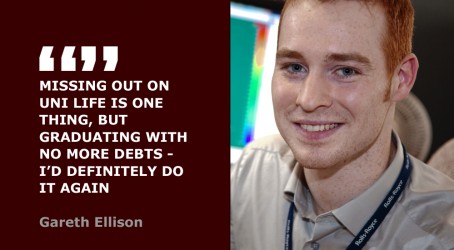The route to becoming a qualified engineer is not an easy one, and neither is it a journey that runs along one single road. While there is the option to go straight to university to do a degree after completing A-levels, some people prefer to do an apprenticeship with a company, which can eventually lead to a full-time job. But some young up-and-coming engineers are choosing to combine both of these routes together – by first doing an apprenticeship and then taking a degree at university, while continuing to work.
What are the benefits of going on such a route, and can juggling a job and studies at the same time really work?
Robert Hazell says it certainly can. The manufacturing engineer is taking a degree while working for engine firm Perkins. Having completed an apprenticeship in maintenance engineering at the company, Hazell is now doing a BEng honours degree in mechanical engineering at Birmingham City University. Perkins allows Hazell paid time off work while at university, which involves him commuting to Birmingham City one day a week to do his studies. Hazell received the Whitworth award from the IMechE, which pays for his tuition fees, but Perkins is funding degrees for other ex-apprentices. Hazell is now in his second year on the degree and attends up to four lectures on day release, while working for the rest of the week at Perkins.
Hazell, who describes himself as having been an average student at school, says that doing a degree this way has been good for him and gave him a way to get into university without having to stay on at school and do his A-levels, once he had completed his GCSEs.
He says what helped him win his place at Perkins had not so much to do with his background and his qualifications, as his attitude and passion towards engineering. From this the company could see that he not only had the potential to do well on an apprenticeship there, but would be more than ready to do a degree at university afterwards, too. It was also through doing the apprenticeship that made Hazell realise what he wanted to do and that he did want to go to university to become a qualified engineer.
He says: “I recognised that Perkins will develop you regardless of your background and your qualifications. It’s the attitude that they are looking for, I guess – if you show that willingness and drive.
“The long-term goal for me is to become chartered,” he adds. “I understand that having an accredited degree at uni will go a long way towards that. I guess after two years I knew engineering was for me and I thought about what I had to do to get to the top of the profession.”
One of the main benefits of doing an apprenticeship before a degree, Hazell says, is that it has better prepared him for university. On his first day on campus he was, for instance, more grown-up, more experienced and ready to take on the degree, compared with those students who had come straight from college. He was also more equipped with skills that are essential during the university years, such as communication and time management.
“I’ve matured a little bit, being in full employment for those two years,” he says. “I’ve not gone blind into university. I’ve picked something that I have passion for. Rather than just turning up and getting by, I’m going there with a bit more of a purpose and a bit more drive.

“It definitely sets you up and puts you in the right mindset,” he adds. “As soon as you are at uni you know what is expected of you, you know what you have to do to come out of it with your head above water. The working environment prepares you for that, rather than just turning up. It’s about being prepared and proactive.”
Gareth Ellison is a young engineer who has successfully completed a degree, post-apprenticeship. After he completed his apprenticeship with Rolls-Royce, the company paid for Ellison to do a BEng degree in mechanical and computer-aided engineering at Sheffield Hallam University, while continuing to work for the company. Ellison completed the degree two years ago and has since been promoted from the position of product definition engineer to stress technologist at the firm.
The four-year degree involved Ellison working at Rolls-Royce and for one day each week commuting to Sheffield Hallam, where he completed around six hours of lectures and tutorials – an arrangement that he enjoyed.
“You get the best of both worlds,” he says. “You get paid employment and then you get an education on top of that as well.”
When he was at school Ellison’s strongest subjects were science, maths and graphics. But school didn’t excite him and he wanted to leave as soon as he completed his GCSEs. While at first he didn’t want to continue his studies, it was from doing the apprenticeship at Rolls-Royce that he knew he wanted to study further to degree level to become a qualified engineer.
“I didn’t necessarily know that I wanted to go to university at the time but I knew there was some college and further learning as part of the apprenticeship,” he says.
“When you are working for an engineering company you have got a wealth of knowledge available from the company and it is easier to see a purpose to certain subjects.”
When finally taking his degree Ellison says his previous experience at Rolls-Royce helped him to see the importance of certain topics he was studying on the course, such as learning about material defects, heat treatments and stress on big structures.
“It is sometimes hard to picture why you’d ever need to use them,” he says. “But if you are working in a department where you are coming up against those problems every day then it makes a lot more sense to you.”
Like Hazell, Ellison says his apprenticeship helped him to develop important skills that proved essential at university, such as time management, multi-tasking and meeting deadlines. Being those few years more mature also made him more prepared to take on a degree.
He says: “Instead of going to university with a schoolyard mentality, you are more professional.”
Ellison admits that studying for a degree and being in a job at the same time is difficult, and sacrifices have to be made, such as to one’s social life, to find a balance between work and studies. It can also take a few years longer to do a degree this way than it would for a full-time student. But he says it is more than worth it in the end, especially with the perk of a salary and the fact that the degree has been paid for.
He says: “The drawbacks are you have a lack of free time, you don’t get holidays between semesters and you miss out on the university social life. It is hard work and you do have to make sacrifices, but I graduated with no debts, a great job and years of engineering experience.
“You get to bring home a good salary as well,” he adds. “This is a massive benefit, especially with the increase in unemployment among graduates and uncertainty once you finish your degree.


“If I was there full time I would have had more time to do the work but because of having that professional upbringing I was working better, I was working more efficiently. Missing out on uni life is one thing, but graduating with no more debts – I’d definitely do it again.”
Matthew Jones, a graduate software engineer at electronics firm Thales, completed his degree slightly differently. Following an apprenticeship with the company, he did a BSc engineering degree in computer science, which is similar to software engineering, at the University of Brighton and graduated in 2010. But, rather than commute to university once a week, he attended full time and then worked at Thales during the summer. Since returning to Thales full time, he is now on the graduate development scheme, where his training continues for another four years while he works towards chartered status with the Institution of Engineering and Technology.
Jones decided to do an apprenticeship and then a degree, while continuing to work, because he felt it would be a good way to learn and earn at the same time.
He says: “I heard about the apprentice scheme at Thales through a family member and I thought it would be a great opportunity to learn and gain experience while getting paid.”
Jones says the benefit of doing a degree this way was that it put him ahead of other university students doing his course, in terms of knowledge and experience in the subject.
“I think by doing an apprenticeship I had a great advantage over other students,” he says. “It allowed me to relate theory and methods to real-world problems and solutions. This gave me a far greater understanding of what we were learning and why, and made it easier for me to start applying this in the workplace.”
Like Hazell and Ellison, he also says the apprenticeship better equipped him for university, as he had already developed essential skills in the workplace.
He says: “I believe I had a good grounding in deadlines and workload, having worked in the apprenticeship prior to joining university. I believe I was a lot better than some at managing my time and sticking to deadlines for coursework.”
Jones says it also helped him to build up technical skills before university, such as knowledge of processes, quality issues and configuration control.
“These disciplines were great for being able to apply the theory we learned at university and enabled me to appreciate why we learn them and question what we’re learning, which, in turn, I believe will make me a more rounded engineer.”
Jones says doing a degree after an apprenticeship is something that he recommends to other people as it gives a great grounding to starting university.
“Not only did I have the financial support of Thales, but also the working support and was able to speak to engineers and gain assistance, with my final year project for example, which is an amazing privilege to have. I would without doubt recommend the route I’ve taken to higher education to others.”
Doing a university degree after an apprenticeship has numerous benefits, as Hazell, Ellison and Jones all clearly demonstrate. There is certainly nothing wrong with doing a university degree straight after school, but having those few extra years on an apprenticeship can help provide some much-needed experience and build those essential skills that will make the degree more enjoyable and the subject matter that bit easier to understand.
The process of studying and working at the same time is, though, no easy feat. It can also take longer to complete a degree this way, not to mention put a strain on social life. But it can also save thousands of pounds on tuition fees, while providing the pleasure of learning and earning and making the student much more mature and professional.
And surely this will help any high, or low, flyer of a student to jump-start their engineering career come graduation day.